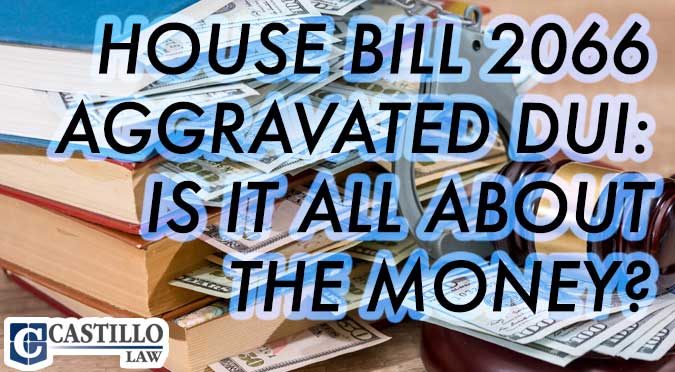
House Bill 2066, as of the date of this blog, looks destined to soon become a law governing Aggravated DUI penalties. As written, this Bill could create some very unexpected and expensive consequences, while offering no real benefit to the community or to the Defendants, most of whom are in need of counseling not expensive incarceration. (Full Legislative history of the Bill is available at: https://apps.azleg.gov/BillStatus/BillOverview/?BillNumber=HB2066&SessionID=117).
Types of Aggravated DUIs Affected By the Bill
Aggravated DUIs are punished very severely here in Arizona under A.R.S. § 28-1383 and § 28-1443. The following are the types of Felony Aggravated DUIs in Arizona that will be affected by the Bill:
Class 4 Felony (Two Priors) Within 84 months: A DUI while the Defendant has two (2) DUI convictions within seven years of the DUI currently charged; and/or
Class 4 Felony for Having a Suspended, Canceled or Revoked Driver’s License: A DUI while the Defendant has a suspended, cancelled, revoked, or refused driver’s license; and/or
Class 4 Felony (Three Priors) Within 84 months: A DUI while the Defendant has three (3) DUI convictions within seven years of the DUI currently charged.
Current Penalties for a First Offense Aggravated DUI, Class Four (4) Felony:
The mandatory minimum incarceration time for an Aggravated DUI is four (4) months in prison for a Defendant with two priors or without a valid license, and eight (8) months in prison for a defendant with three priors. If a defendant has three priors, the offender is not eligible to do his/her incarceration time in jail, a work release or work furlough program, or a home detention program.
Other penalties include mandatory alcohol screening and classes; mandatory fines of approximately $6,000, probation (including monthly probation visits, monthly probation fees, and random alcohol/drug testing at any time); a revocation by the MVD of the driver’s license and/or privilege; SR22 High Risk Insurance; and a 2-year Ignition Interlock Device. Coupled with their higher insurance premiums, this can cost the Defendant over $13,000. At this time, Defendants are not forced to pay their incarceration costs on top of these penalties. (For a detailed description for current penalties for an Aggravated DUI see our Aggravated DUI section at: https://castillolawphoenix.com/Aggravated-DUI-defense-lawyer/)
Changes to the Aggravated DUI Mandatory Penalties Made By the Bill
House Bill 2066’s purpose is to allow a convicted Aggravated DUI Defendant to serve his/her minimum mandatory four 4 months (8 months if three priors within seven years) in a participating County Jail instead of the Arizona Department of Corrections (also known as prison). (The full Bill is available at https://www.azleg.gov/legtext/53leg/1r/bills/hb2066h.pdf).
Bill Problem #1: Cost to the Defendant
This Bill may sound like a positive change because no one likes the idea of going to prison. Getting to serve the time in jail instead of prison may sound better to the average affected Defendant, but a closer read of the Bill demonstrates that other than the location itself, it really has no benefit for the person serving the time. The most important thing to most of our clients facing this conviction is being able to continue to work and support their families while serving their punishment. As criminal defense attorneys, we do our best to obtain dismissals or acquittals. When that is not possible, we try to negotiate a plea agreement to a lesser-offense which would allow for jail time with work furlough or work release so they can work during the day and spend their nights at the jail.
However, House Bill 2066 prevents “early release, or a prisoner work, community restitution work and home detention program, a continuous alcohol monitoring program or any other release of any kind.” So, no two-for-one credit, no getting out to go to work or to get substance abuse treatment, no community service, and no home detention or anything else that could possibly help a Defendant, their family, or the community. Instead, they will have to sit in the County Jail for the full four (or eight) months just like they would if they were going to prison, with very little to no treatment available to them. Plus, they will have to pay the cost of their incarceration, which if you live in Maricopa County, will be an additional $12,430.33. (Amount provided by the Clerk of the Scottsdale Municipal Court regarding the cost of 120 days in the Maricopa County Jail). With the House Bill 2066’s passage, it will cost a Defendant roughly $25,430 if convicted of an Aggravated DUI with 4 months in jail.
Bill Problem #2: Jail Overcrowding with Worse Services
According to an Arizona Criminal Justice Commission 2017 study, in 2016 there were 31,594 new felony cases that were charged by felony prosecutors in the State of Arizona, and only 48.3 % of them were adjudicated within 180 days. (See https://www.azcjc.gov/ACJC.Web/Pubs/Home/FY2016%20Fill%20the%20Gap%20Report_ACJC_01%2006%202017.pdf). (Note: A criminal defendant has a Constitutional Right to Speedy Trial within 180 days from their arrest. County jails are typically not set up to house inmates for more than an 180-day period). This means that our jails are already overcrowded with felony Defendants awaiting trial and an influx of sentenced Aggravated DUI Defendants will only exasperate the problem.
Furthermore, the services at the County Jails are notoriously worse than Arizona Department of Corrections, including food, medical services, substance abuse programs, and visitation rules (personal contact with family members is allowed in many of the Department of Corrections facilities but is not in many County Jail facilities).
Overall, House Bill 2066 benefits no one but the County Jails, which will stay overcrowded, but will now line their pockets with an extra $12,430.33 per non-violent offender. In turn, these offenders will receive no treatment and most likely lose their jobs.
If you or someone you know is facing any of these charges, Castillo Law is available 24/7 to take your call at (602) 795-6701 or 480-206-5204.

